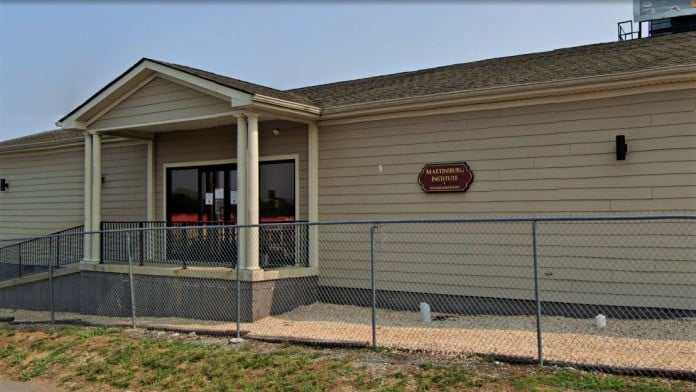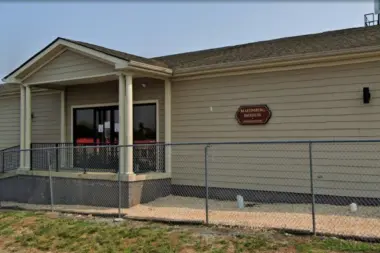All the ones that come here get a chance to get their life back on track, it is up to them if they take it. I feel comfortable there and thankful for finding it. Staff genuinely care and are always willing and able to help you
About Martinsburg Institute – Methadone Clinic & Suboxone Clinic
Their program uses medication assisted treatment with methadone. This FDA approved medication can alleviate cravings and withdrawal symptoms associated with quitting opioids. That way you can focus solely on tackling the psychological effects of addiction. You can participate in group and individual counseling, peer support groups and more. These approaches can help you get to the root of addiction and develop coping skills to make healthier choices.
What stands out most to me is they offer family and relationship services. You and your loved ones can benefit from communication support and rebuilding your family unit. They understand that addiction is a familial disease and your loved ones need help as well. You and your family can receive encouragement and guidance in your journey to promote overall wellbeing for everyone.
Another great feature I noticed was their referral services. Recovery is different for everyone. Depending on your unique situation outpatient care may not be the right fit. Their dedicated team can refer you to higher levels of care or other local resources to aid in your journey.
Many previous clients enjoyed their services. Some mentioned a friendly and supportive staff with beneficial approaches to reach recovery. Others felt some counselors lacked experience. As always, be sure to research and consider multiple facilities to find appropriate care.
Latest Reviews
Rehab Score
Gallery


Other Forms of Payment
Self-pay involves paying for treatment out of your own pocket. You can use savings or credit, get a personal loan, or receive help from family and friends to fund your treatment. If you don't have insurance or your insurance plan doesn't cover a specific program, self-pay can help ensure you still get the care you need.
Medicaid is a state based program that helps lower-income individuals and families pay for healthcare. Medicaid covers addiction treatment so those enrolled can use their coverage to pay for rehab. When a program accepts Medicaid the client often pays very little or nothing out of their own pocket.
Addiction Treatments
Levels of Care
Outpatient Programs (OP) are for those seeking mental rehab or drug rehab, but who also stay at home every night. The main difference between outpatient treatment (OP) and intensive outpatient treatment (IOP) lies in the amount of hours the patient spends at the facility. Most of the time an outpatient program is designed for someone who has completed an inpatient stay and is looking to continue their growth in recovery. Outpatient is not meant to be the starting point, it is commonly referred to as aftercare.
Intensive Outpatient Programs (IOP) are for those who want or need a very structured treatment program but who also wish to live at home and continue with certain responsibilities (such as work or school). IOP substance abuse treatment programs vary in duration and intensity, and certain outpatient rehab centers will offer individualized treatment programs.
Participants in 12 step programs receive ongoing peer support while cultivating recovery-focused life skills. They engage in frequent, sometimes daily, 12 step meetings, which are anonymous, free, peer-led, and available day and night in most communities. Self-selected sponsors offer one-on-one mentoring throughout the recovery journey. This model invokes spiritual principles to encourage self-awareness, forgiveness, accountability, and acceptance in persons pursuing recovery. Specialized formatting is common, including programs for teens, seniors, and family members.
Planning a drug intervention in West Virginia is a challenging process. Often, complex family dynamics and long-term patterns of behavior are contributing to the addiction. Drug intervention programs offer intervention specialists who can help with this process. These professionals educate everyone involved about substance abuse, addiction, enabling, and recovery. They can facilitate the intervention, keeping the discussion on track and productive. They can also provide treatment options and guide the individual to the best program.
Drug and alcohol addiction often takes a heavy toll on one's body. Over time, a physical dependence can develop, meaning the body physiologically needs the substance to function. Detox is the process of removing drugs and/or alcohol from the body, a process that can be lethal if mismanaged. Medical detox is done by licensed medical professionals who monitor vital signs and keep you safe, healthy, and as comfortable as possible as you go through detox and withdrawal.
Treatments
Opioid rehabs specialize in supporting those recovering from opioid addiction. They treat those suffering from addiction to illegal opioids like heroin, as well as prescription drugs like oxycodone. These centers typically combine both physical as well as mental and emotional support to help stop addiction. Physical support often includes medical detox and subsequent medical support (including medication), and mental support includes in-depth therapy to address the underlying causes of addiction.
Substance rehabs focus on helping individuals recover from substance abuse, including alcohol and drug addiction (both illegal and prescription drugs). They often include the opportunity to engage in both individual as well as group therapy.
Programs
Adult rehab programs include therapies tailored to each client's specific needs, goals, and recovery progress. They are tailored to the specific challenges adult clients may face, including family and work pressures and commitments. From inpatient and residential treatment to various levels of outpatient services, there are many options available. Some facilities also help adults work through co-occurring conditions, like anxiety, that can accompany addiction.
Young adulthood can be an exciting, yet difficult, time of transition. Individuals in their late teens to mid-20s face unique stressors related to school, jobs, families, and social circles, which can lead to a rise in substance use. Rehab centers with dedicated young adult programs will include activities and amenities that cater to this age group, with an emphasis on specialized counseling, peer socialization, and ongoing aftercare.
Clinical Services
Through cognitive behavioral therapy in West Virginia, therapists encourage clients to identify negative thoughts, gain control over them, and develop ways to change their behaviors. This can be an effective way to break the cycle of addiction and overcome substance use disorder.
Group therapy is any therapeutic work that happens in a group (not one-on-one). There are a number of different group therapy modalities, including support groups, experiential therapy, psycho-education, and more. Group therapy involves treatment as well as processing interaction between group members.
In individual therapy, a patient meets one-on-one with a trained psychologist or counselor. Therapy is a pivotal part of effective substance abuse treatment, as it often covers root causes of addiction, including challenges faced by the patient in their social, family, and work/school life.
Motivational interviewing in West Virginia is often used when the client's desire to change is low, their confidence is low, or they are struggling with mixed feelings about change. This technique allows them to explore the change process and feel empowered to move forward.
Trauma therapy gives you a structured approach to healing from past traumatic events. You can experience the emotional and psychological impact of trauma whether you witness an event or experience it. Your therapist guides you in understanding your responses and helps you develop healthier coping skills.
A counselor can apply couples therapy techniques to guide partners through a variety of relationship challenges. Couples therapy in West Virginia can address infidelity, substance use, disconnect, and family issues. It is appropriate for intervention in both new and seasoned relationships.
Research clearly demonstrates that recovery is far more successful and sustainable when loved ones like family members participate in rehab and substance abuse treatment. Genetic factors may be at play when it comes to drug and alcohol addiction, as well as mental health issues. Family dynamics often play a critical role in addiction triggers, and if properly educated, family members can be a strong source of support when it comes to rehabilitation.
Accreditations

The Substance Abuse and Mental Health Services Administration (SAMHSA) is a branch of the U.S. Department of Health and Human Services. Established in 1992 by congress, SAMHSA's mission is to reduce the impact of substance abuse and mental illness on American's communities.
SAMHSA Listed: Yes

The Commission on Accreditation of Rehabilitation Facilities (CARF) is a non-profit organization that specifically accredits rehab organizations. Founded in 1966, CARF's, mission is to help service providers like rehab facilities maintain high standards of care.
CARF Accreditation: Yes

State Licenses are permits issued by government agencies that allow rehab organizations to conduct business legally within a certain geographical area. Typically, the kind of program a rehab facility offers, along with its physical location, determines which licenses are required to operate legally.
State License: West Virginia
Contact Information
223 Eagle School Road
Martinsburg, WV 25401